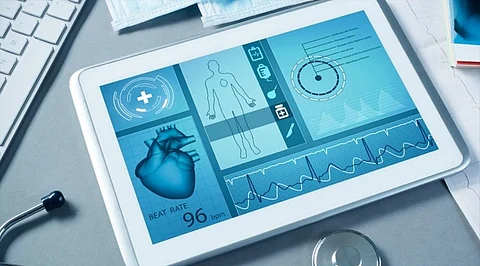

Like every other industry, technology is making significant inroads into the healthcare industry as well. The speed at which medical innovations are taking place is leading to the digital transformation of the industry.
Currently, there is a need for better patient engagement and experience. In addition, data generated, tracked, analyzed, and used in real-time by innovative medical devices is healthcare's new currency. All in all, digital transformation is catalyzing research and development (R&D), improving operational performance, productivity, efficiency, and cost-effectiveness across the entire healthcare value chain.
The fundamental driving forces behind digital transformation are the emerging technologies that provide a company a digital foundation and competitive advantage. These include artificial intelligence (AI), blockchain, cloud, and virtual reality. And, embracing these technologies will enable biopharma companies to innovate new products and services, engage customers more effectively, and execute processes more efficiently.
In this regard, let's take a look at the state of digital transformation in healthcare in 2021:
• On-demand Healthcare: The shift to on-demand care is increasing. Talking about 'on-demand healthcare' means patients who can consult doctors at their convenience, time, and wherever they happen to be. It is proving to be beneficial, especially for patients suffering from chronic diseases or other non-serious ailments. The significant advances in telemedicine and communication channels are helping consumers get treated via video calls. For instance, companies such as Nomad Health – an online marketplace that connects doctors directly with medical facilities for short-term work – are helping physicians to provide on-demand healthcare to clients in specific circumstances that match their talents, expertise, and schedule.
• Alternative to Medicines: Virtual Reality (VR) is being used in several areas of healthcare. Considered a safer and more efficient alternative to drugs, this technology is being used to treat pain, anxiety, post-traumatic stress disorder, and stroke, among others. Besides, virtual-reality simulations are being used by doctors and residents to hone their skills or to plan complicated surgeries. In addition, VR headsets are also being used as a tool to help children with autism learn how to navigate the world.
• Rise of Wearable Devices: Previously, most people underwent a physical examination or health check-up once a year when something went wrong. But today, people are actively focusing on prevention, thereby demanding information about their health more frequently. So, healthcare companies invest in wearable technology devices that can continuously track and collect patient's health data. It can provide up-to-date monitoring of high-risk patients and identify the possibility of a significant health event.
• Predictive Analytics: The ongoing COVID-19 pandemic taught the world the need to be prepared for everything. Predictive analytics helps in providing a heads-up about possible circumstances before they happen. The method helps determine what diseases may become significant problems shortly, the state of a patient, admission rates, and help hospitals adequately staff their facilities, etc. Therefore, predictive analytics in healthcare can help doctors or healthcare providers react as quickly as possible to any change.
• AI-enabled tools and services: AI is emerging as another integral aspect of healthcare services. Patients are becoming familiar with AI-based chatbots and virtual health assistants. AI in medicine could mean a robot assisting human nurses with routine tasks such as fetching and restocking supplies. Besides, AI can be further used in precision medicine, drug discovery, medical imaging, and genomics.
• Blockchain: It is proving to be an effective tool in the healthcare industry. It is facilitating the transfer of patient medical records securely and managing the medicine supply chain. It is an electronic health record (EHR) or the digital version of a medical chart that includes everything from a patient's medical history and diagnosis to treatment plans, immunization dates, and test results, along with their demographic and financial details. Therefore, through blockchain, the healthcare system can bring accuracy as well as eliminate hacking of information.
• 5G mobile technology for instantaneous healthcare: 5G tech allows for instant streaming, downloading, and uploading. In telemedicine, this means patients will experience better video conference quality, regardless of location. In addition, doctors will have access to precise, real-time imaging of organs, bones, etc., which will significantly decrease the risk of misdiagnosis. 5G is designed to support technologies such as artificial intelligence and extended reality to enhance current services and applications, thereby offering a better user experience.
• Hospital Management 4.0: Information overload, lack of real-time interventions, or ineffective communication are some of the core challenges in hospital management. But with hospital management 4.0, such roadblocks can be addressed with modern technologies. Hospital management 4.0 includes communication of all hospital data in real-time without disruptions; digital networking via IoT; end-to-end process organization to minimize trigger-actions among patients; and patient-centered services.
The winds of change have begun to blow in the healthcare system. However, it still has a long way to make itself accessible and comfortable for patients and technologically savvy users to reach across borders. Technology will undoubtedly play a significant role in enhancing the digital healthcare space and empowering healthcare practitioners to build unique experiences.
Author
Sudeshna Datta, Co-Founder & Executive Vice President, Absolutdata
Join our WhatsApp Channel to get the latest news, exclusives and videos on WhatsApp
_____________
Disclaimer: Analytics Insight does not provide financial advice or guidance. Also note that the cryptocurrencies mentioned/listed on the website could potentially be scams, i.e. designed to induce you to invest financial resources that may be lost forever and not be recoverable once investments are made. You are responsible for conducting your own research (DYOR) before making any investments. Read more here.
